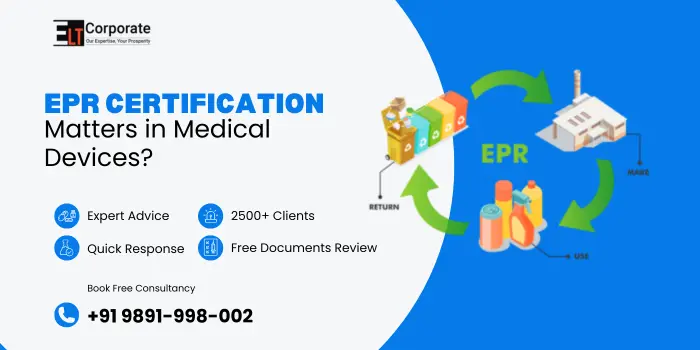EPR Certification matters in Medical Devices is one of the most important regulatory requirements today. EPR stands for Extended Producer Responsibility, which means that medical device manufacturers, importers, or brand owners are responsible for managing the waste generated from their products after use. In simple words, companies must ensure proper collection, recycling, and disposal of medical device waste in an eco-friendly way.
For medical devices, EPR Certification is not just about following the law, but also about building trust, sustainability, and safety. Without this certification, businesses may face penalties, bans on selling products, or reputational damage. This makes EPR Certification in Medical Devices highly important for every stakeholder in the healthcare sector.
What is EPR Certification in Medical Devices?
EPR Certification in Medical Devices is an approval given by the Central Pollution Control Board (CPCB), which makes manufacturers and importers responsible for the end-of-life disposal of their devices. It ensures that harmful waste from medical devices is not dumped in the environment but managed safely.
Why is EPR Certification Important for Medical Devices?
The importance of EPR Certification in Medical Devices can be understood from both legal and practical points of view:
| S.No. | Aspect | Why It Matters |
|---|---|---|
| 1. | Legal Requirement | It is mandatory under CPCB guidelines; without it, selling medical devices is non-compliant. |
| 2. | Environmental Safety | Ensures proper recycling and disposal of harmful medical waste. |
| 3. | Brand Image | Builds trust among hospitals, patients, and authorities. |
| 4. | Market Access | Many hospitals and healthcare institutions only work with EPR-certified companies. |
| 5. | Penalty Protection | Helps avoid heavy fines, product bans, or legal actions. |
Who Needs EPR Certification in Medical Devices?
The following businesses must obtain EPR Certification:
- Manufacturers of medical devices (domestic or foreign).
- Importers who bring medical devices into India.
- Brand owners who sell medical devices under their own name.
- Distributors or sellers if they are the first entity introducing the product to the Indian market.
What is the Process of Getting EPR Certification in Medical Devices?
The process of obtaining EPR Certification in Medical Devices involves several steps:
- Application Preparation – Collect business details, product list, and waste management plan.
- Submission to CPCB – Apply online with required documents.
- EPR Plan Approval – Explain how the waste will be collected, recycled, or disposed of.
- Grant of EPR Certificate – Once approved, CPCB issues the certificate.
- Annual Returns – Submit yearly compliance reports to CPCB to maintain certification.
What Documents are Required for EPR Certification in Medical Devices?
Common documents include:
- Company PAN, GST, and incorporation certificate.
- Import-Export Code (if importing).
- Product details and technical specifications.
- Agreement with waste management/recycling agency.
- EPR plan for the collection and disposal of waste.
Benefits of EPR Certification in Medical Devices
Having EPR Certification brings multiple advantages:
- Full legal compliance under Indian waste management laws.
- Increased trust with hospitals and medical professionals.
- Smooth entry into competitive healthcare markets.
- Positive environmental contribution.
- Protection from penalties and product restrictions.
Difference Between EPR Certification in Medical Devices and Other Products
| S.No. | Factor | Medical Devices | Other Products (like electronics, plastics) |
|---|---|---|---|
| 1. | Waste Type | Hazardous & biomedical waste | Mostly electronic or plastic waste |
| 2. | Risk Level | High risk to human health & environment | Moderate to high, depending on the product |
| 3. | Compliance Pressure | Very strict due to patient safety concerns | Strict but comparatively lower |
| 4. | Documentations | More detailed, includes biomedical waste handling plans | Standard recycling/disposal plans |
How Can ELT Corporate Help You with EPR Certification in Medical Devices?
Getting EPR Certification in Medical Devices can be complex because it requires technical documentation, CPCB approvals, and waste management tie-ups. This is where ELT Corporate, the best regulatory consultancy, can make the process simple for you.
- Preparing and filing your EPR Certification application.
- Drafting complete EPR waste management plans.
- Coordinating with CPCB for faster approvals.
- Assisting in tie-ups with authorized recyclers and waste agencies.
- Ensuring timely submission of annual returns.
- Reducing the risk of rejections or penalties.
- Providing end-to-end support until you receive your certificate.
- Offering continuous compliance monitoring for your business.
How can Medical Device Companies Ensure ongoing EPR Compliance?
Medical device companies can ensure ongoing EPR compliance by regularly reporting waste collection, maintaining recycling records, and partnering with authorized recyclers or PROs.
Is EPR Certification mandatory for all medical devices?
Yes, all medical device manufacturers and importers must have EPR Certification.
Who issues EPR Certification in India?
The Central Pollution Control Board (CPCB) issues EPR Certification.


Comments are closed